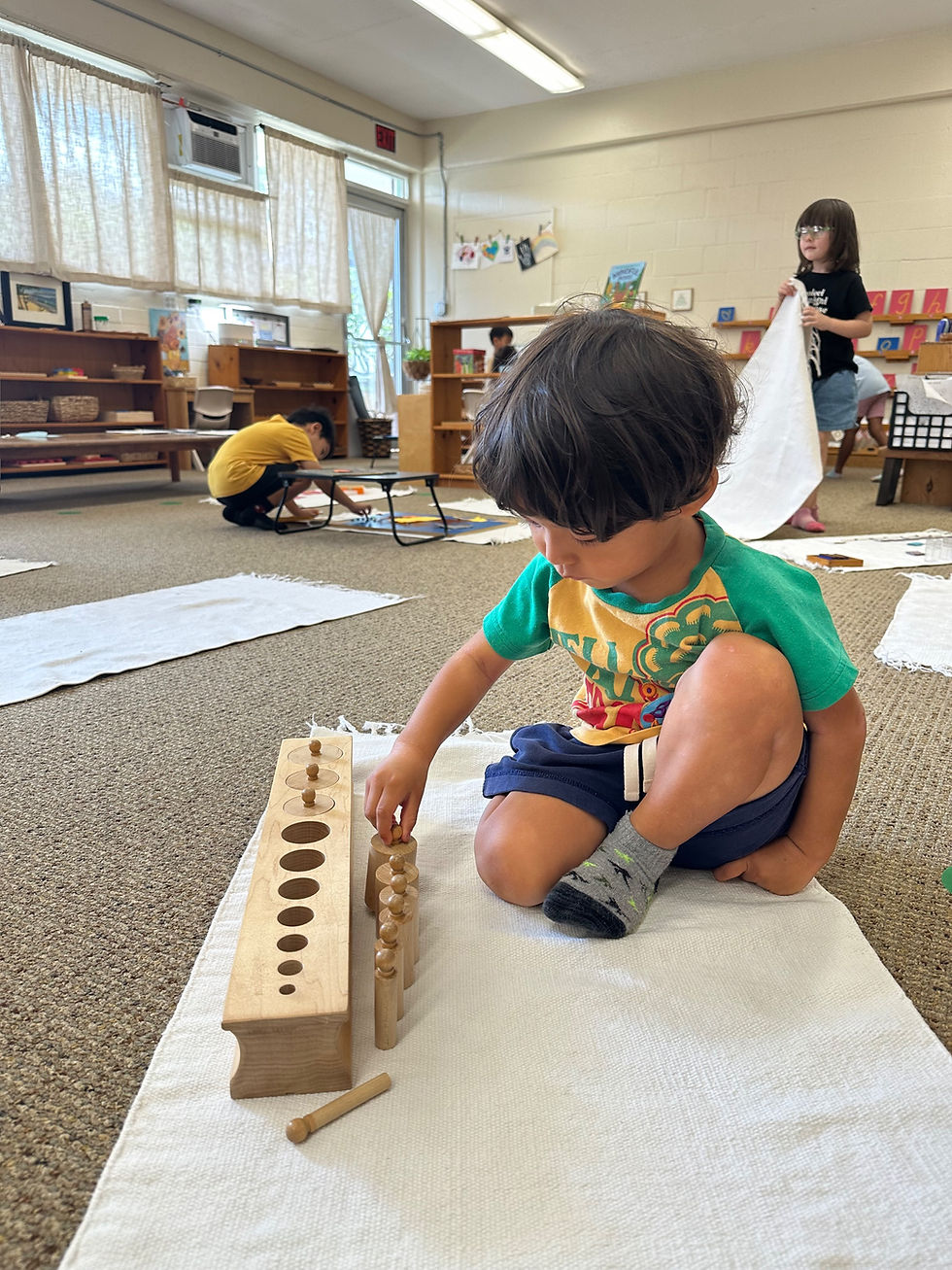The Importance of Gross Motor Development in a Montessori Preschool
- Montessori Community School

- Jul 12, 2023
- 3 min read

“When there is motor and physical activity, you can see a more important kind of education, a kind of education that takes the force of life into account. This education is not driven by its own wisdom, but by another superior wisdom which lays down the law that, if we do not take the vital force into account, we miss the best part of education.”
Dr. Maria Montessori, The 1946 London Lectures
When thinking of a Montessori classroom, there can sometimes be a tendency to focus on activities which support the development of fine motor skills, so the importance of gross motor skills – the development and coordination of those large, gross motor muscles and movements – can be overlooked. Gross motor skills are essential for a child’s development, helping children with movement and coordination. Gross motor development is critical to balance, coordination, and connection to other body functions.
In a Montessori classroom, gross motor movements include natural movement around the room (choosing one activity after another, moving tables and chairs, walking), lifting and pouring, Practical Life activities like window washing or table scrubbing, or walking along a line.
Maria Montessori knew how integral movement is to intellectual development. “Movement helps the development of the mind, and this finds renewed expression in further movement and activity."
What are Gross Motor Skills?
What do we mean when we say “gross motor skills?” When you think of gross motor skills or development, think of using our big muscles—legs and arms. Gross motor skills are the abilities required to control the large muscles of the body for activities such as crawling, walking, running, jumping, and throwing. These skills are important for physical development, coordination, and overall health and well-being.
Gross motor skills are abilities that allow people to do things that involve using the large muscles in the torso, arms, and legs to complete whole-body movements.
Examples of Gross Motor Skills
Gross motor skill examples include the use of larger muscles. So, consider running, skipping, riding a bike, throwing a baseball, lifting a weight, climbing a rock, jumping rope, or kicking a soccer ball.
Encouraging the development of gross motor skills can help foster a child’s imagination through story-telling and active play, encourage problem-solving and critical thinking (e.g., how will I climb over this log?), hone risk-taking skills, ignite a sense of awe and wonder about the natural world, and even improve sleep.
5 Statistics that Show the Importance of Developing Strong Gross Motor Skills
Academic Achievement: Research shows that children who possess well-developed gross motor skills tend to perform better academically. A study published in the Journal of School Health revealed that students with higher levels of physical fitness, including gross motor skills, had higher academic achievement scores.
Social and Emotional Development: Strong gross motor skills play a crucial role in children’s social and emotional development. A study conducted by the American Academy of Pediatrics found that children with better motor skills had higher levels of self-confidence, improved social interactions, and better overall emotional well-being.
Cognitive Skills: Gross motor skills contribute to the enhancement of cognitive abilities in children. A study published in the International Journal of Environmental Research and Public Health found a positive correlation between motor skills and cognitive function, suggesting that improved motor skills can enhance cognitive processing, attention, and memory.
Physical Health and Fitness: Developing strong gross motor skills in childhood lays the foundation for a healthier and more active lifestyle. According to the Centers for Disease Control and Prevention (CDC), regular physical activity, including activities that promote gross motor skills, helps children maintain a healthy weight, build strong bones and muscles, and reduce the risk of developing chronic health conditions.
Overall Development: Gross motor skills are essential for a child’s overall development. The World Health Organization (WHO) emphasizes that these skills are critical for fundamental movement abilities, such as running, jumping, and throwing, which are the building blocks for more complex physical activities later in life. Developing these skills early on sets the stage for future success in sports, recreational activities, and everyday tasks.
Gross Motor Skills Activities
Summertime is a great time to get out and practice gross motor skills. Climbing rocks and trees, navigating obstacle courses, playing games like Freeze Tag and Hide-and-Seek, hiking with the family, swimming, jumping rope, playing hopscotch, learning to gallop and skip, riding tricycles or bicycles, and dancing are just a few activities that will help children develop importance gross motor skills. And, by the way, have fun, too!

Sources:
Carrots are Orange newsletter






